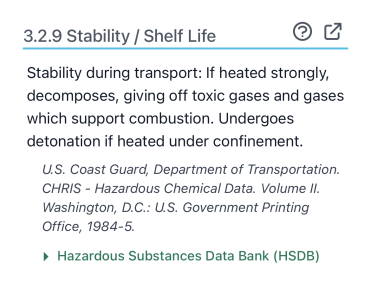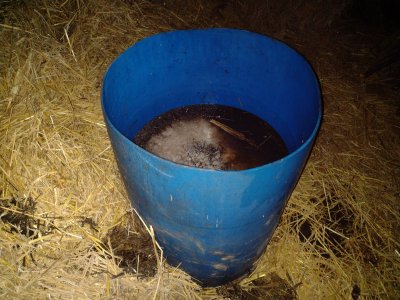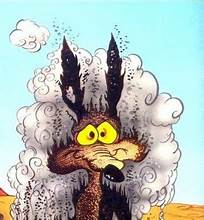You are using an out of date browser. It may not display this or other websites correctly.
You should upgrade or use an alternative browser.
You should upgrade or use an alternative browser.
Would this be dangerous ?
- Thread starter devonian
- Start date

Help Support CattleToday:
coachg
Well-known member
Guess what the N in TNT  stands for ? So my answer would be a definite maybe
stands for ? So my answer would be a definite maybe 
puzzled in oregon
Well-known member
- Joined
- May 31, 2020
- Messages
- 829
- Reaction score
- 1,098
No harm in trying.
puzzled in oregon
Well-known member
- Joined
- May 31, 2020
- Messages
- 829
- Reaction score
- 1,098
I have had small amounts of fertilizer draw dampness and reach a point where it was not spreadable.
I take it to a place set up to dispose of hazardous waste.
I take it to a place set up to dispose of hazardous waste.
CowboyRam
Well-known member
If you do do it, video it so we all can see; it might make for some good watching.
devonian
Well-known member
I would happily do this but I need to know that it won't decimate half the farm first, some idea of the blast zone radius so I know how close I can film if I can filmIf you do do it, video it so we all can see; it might make for some good watching.
CowboyRam
Well-known member
I would be afraid to. We don't want you to blow yourself up. Maybe that might be something that should be left to the Myth Busters.I would happily do this but I need to know that it won't decimate half the farm first, some idea of the blast zone radius so I know how close I can film if I can film
Silver
Well-known member
Dynamite burns fine, I don't know why straight ammonia nitrate wouldn't as well.
redcowsrule33
Well-known member
Wasn't it ammonium nitrate that leveled part of Beirut?
It was used in the first World Trade Center bombing, Oklahoma City federal building bomb. It is also used every day in mining. But it is also the same formula that is used in millions of def systems. Ammonium nitrate and diesel fuel.
Has a high ignition temp and produces its own oxygen once ignited that is why it burns hot once ignited and why it is used in def systems. Increases the amount of oxygen present so it allows higher temperatures and a more complete burn of any fuel pollutants in the exhaust.
Has a high ignition temp and produces its own oxygen once ignited that is why it burns hot once ignited and why it is used in def systems. Increases the amount of oxygen present so it allows higher temperatures and a more complete burn of any fuel pollutants in the exhaust.
Cowman42
Active member
- Joined
- Oct 10, 2023
- Messages
- 43
- Reaction score
- 60
And the Oklahoma Federal Building?Wasn't it ammonium nitrate that leveled part of Beirut?
Silver
Well-known member
From the interwebs: It is classified as an oxidizer and will accelerate burning when involved in a fire. Ammonium nitrate itself does not burn, but in contact with other combustible materials it increases fire hazard and supports fire even in the absence of O2.
GoWyo
Well-known member
Spread it around the bonfire, probably won't notice much.
Travlr
Well-known member
Why aren't you spreading it where it might do some good?Having a bit of a farm clear up, the bonfire night clear up wasn't enough so doing another. Would it be dangerous to put this half barrel of old fertiliser (yes the ammonia nitrate kind) on top a bonfire?
Depends on what your definition of is is I guess. Use what ever term you want at high temperature a reaction occurs increasing the amount of oxygen available to the fire wich results in a hotter fire, that is far more difficult if not almost impossible to put out.From the interwebs: It is classified as an oxidizer and will accelerate burning when involved in a fire. Ammonium nitrate itself does not burn, but in contact with other combustible materials it increases fire hazard and supports fire even in the absence of O2.

devonian
Well-known member
Because it has got wet, stuck to the barrel and rock solidWhy aren't you spreading it where it might do some good?
Last edited:
Caustic Burno
Well-known member
There is a cemetery in Texas City full of body parts from burning ammonia nitrate.
It deflagrates.
It deflagrates.
puzzled in oregon
Well-known member
- Joined
- May 31, 2020
- Messages
- 829
- Reaction score
- 1,098
Similar threads
- Replies
- 67
- Views
- 2K

